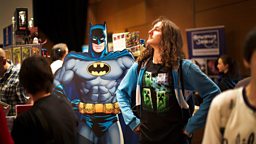āBeing Edanā and Generation 2014
Being Edan Q & A
Generation 2014 producer Dave Howard answers questions about his programme āBeing Edanā, a snapshot of life for an autistic teenager from Aberdeen.
What made you want to tell Edanās story?
Scotlandās 16 and 17 year olds are making history this week, as the first ever people their age to vote on a major matter of UK state. Ö÷²„“óŠć Scotlandās Generation 2014 project, which I help to run, shines a light on their age-group. Its aim is to give insight into their lives, passions, and points of view.
As one of 50 young people involved in Generation 2014, Edan has thrown himself into projects including a televised National Theatre of Scotland production of āNowās the Hourā, and interviews for Scotland 2014, Good Morning Scotland and elsewhere.
However, his autism sometimes makes him stand apart from the cohortās other 49 members. When we bring the group together, he admits to finding it challenging, interacting with so many āneuro-typicalā (non-autistic) young people.
In conversation, Edan also emerges as an interesting, perceptive and hugely likeable character. On spending time with him, I discovered that I personally knew very little about his condition (apart from the usual stereotypes). It made complete sense to try to find out more about him, and to tell his story.
Edanās mum Carrie says he is āfull of surprisesā. What are some of those surprises?
We learn quite quickly in the programme about his love of karaoke, and heās got quite a knack for quoting lengthy bursts of dialogue from favourite TV comedy shows.
We also learn how, when Edan was younger, he lived much of his life in an imaginary other world, that he called Star Jute. It was somewhere to retreat to when things got on top of him here on Earth.
It was fascinating poring over old sketches, that depicted harvests of imagined Star Jute fruit ā with names like ādragonberriesā and ācosmic applesā. It was also fascinating to hear Edan say Star Jute is still part of his life as a 16-year-old; he just doesnāt feel the need to go there now as often as he used to.
What do you hope listeners will take away from āBeing Edanā?
My fond hope is that listeners can move over the course of the programme from thinking of Edan as just āautisticā to realising that heās a much bigger, more complete personality.
If they do that, they will make a similar journey to the one I made myself, over the course of getting to know Edan and working with him on the programme.
Edanās mum Carrie is very clear that other people should āquestion their own assumptionsā about what they think of as normal.
The family all feel that life would be much easier for autistic people if society was more accepting of the unusual traits that might mark them out from others.
Their message can be applied, not just to those with autism, but to anyone with a point of difference.
āThe word ānormalā applied to human behaviour is highly inappropriate,ā Edan says, towards the end of the programme.
He goes on: āNormal is the birth of a star, or of a life. There is no ānormalā personality.
āIf you try to play a game of snap with personalities, the next time somebody finds you, youāll be skeletons.ā
Edan posing with Batman image courtesy of Kieran Dodds

